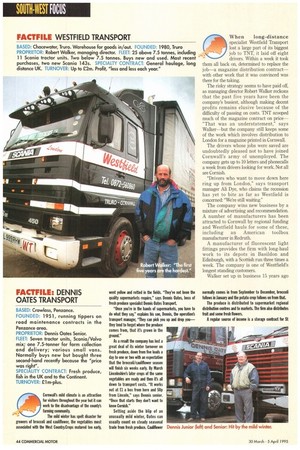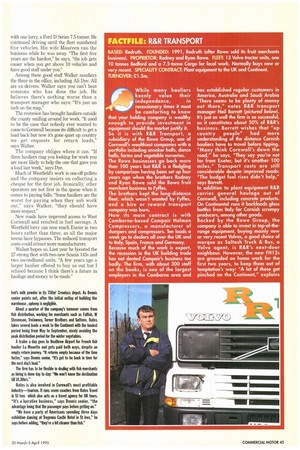When long-distance specialist Westfield Transport lost a large part of
Page 46

Page 47

If you've noticed an error in this article please click here to report it so we can fix it.
its biggest job to TNT, it laid off eight drivers. Within a week it took them all back on, determined to replace the job—a magazine distribution contract— with other work that it was convinced was there for the taking.
The risky strategy seems to have paid off, as managing director Robert Walker reckons that the past five years have been the company's busiest, although making decent profits remains elusive because of the difficulty of passing on costs. TNT scooped much of the magazine contract on price "That was an understatement," says Walker—but the company still keeps some of the work which involves distribution to London for a magazine printed in Cornwall.
The drivers whose jobs were saved are undoubtedly pleased not to have joined Cornwall's army of unemployed. The company gets up to 10 letters and phonecalls a week from drivers looking for work_ Not all are Cornish.
"Drivers who want to move down here ring up from London," says transport manager Ali Dye, who claims the recession has yet to bite as far as Westfield is concerned: "We're still waiting."
The company wins new business by a mixture of advertising and recommendation. A number of manufacturers has been attracted to Cornwall by regional funding and Westfield hauls for some of these, including an American toolbox manufacturer in Redruth.
A manufacturer of fluorescent light fittings provides the firm with long-haul work to its depots in Basildon and Edinburgh, with a Scottish run three times a week. The company is one of Westfield's longest standing customers.
Walker set up in business 15 years ago with one lorry, a Ford D Series 7.5-tonner. He continued driving until the fleet numbered five vehicles. His wife Maureen ran the business while he was away. "The first five years are the hardest," he says, "the job gets easier when you get above 10 vehicles and have good staff under you."
Among these good staff Walker numbers the three in the office, including Ali Dye. All are ex-drivers. Walker says you can't beat someone who has done the job. He believes there's nothing worse than a transport manager who says: "It's just an inch on the map."
The recession has brought hauliers outside the county sniffing around for work. "It used to be the case that nobody ever wanted to come to Cornwall because its difficult to get a load back but now it's gone quiet up country we get requests for return loads," says Walker.
The company obliges where it can. "If three hauliers ring you looking for work you are more likely to help the one that gave you a load last week," says Dye.
Much of Westfield's work is one-off pallets and the company insists on collecting a cheque for the first job. Ironically, other operators are not first in the queue when it comes to paying bills. "Some hauliers are the worst for paying when they sub work out," says Walker, "they should have more respect."
New roads have improved access to West Cornwall and resulted in fuel savings. A Westfield lorry can now reach Exeter in two hours rather than three, as all the major towns have bypasses. The reduced transport costs could attract more manufacturers.
Walker hopes so. Last year he boosted the 27-strong fleet with two new Scania 143s and two secondhand units. "A few years ago a larger haulier offered to buy us out but I refused because I think there's a future in haulage and money to be made."
































































































